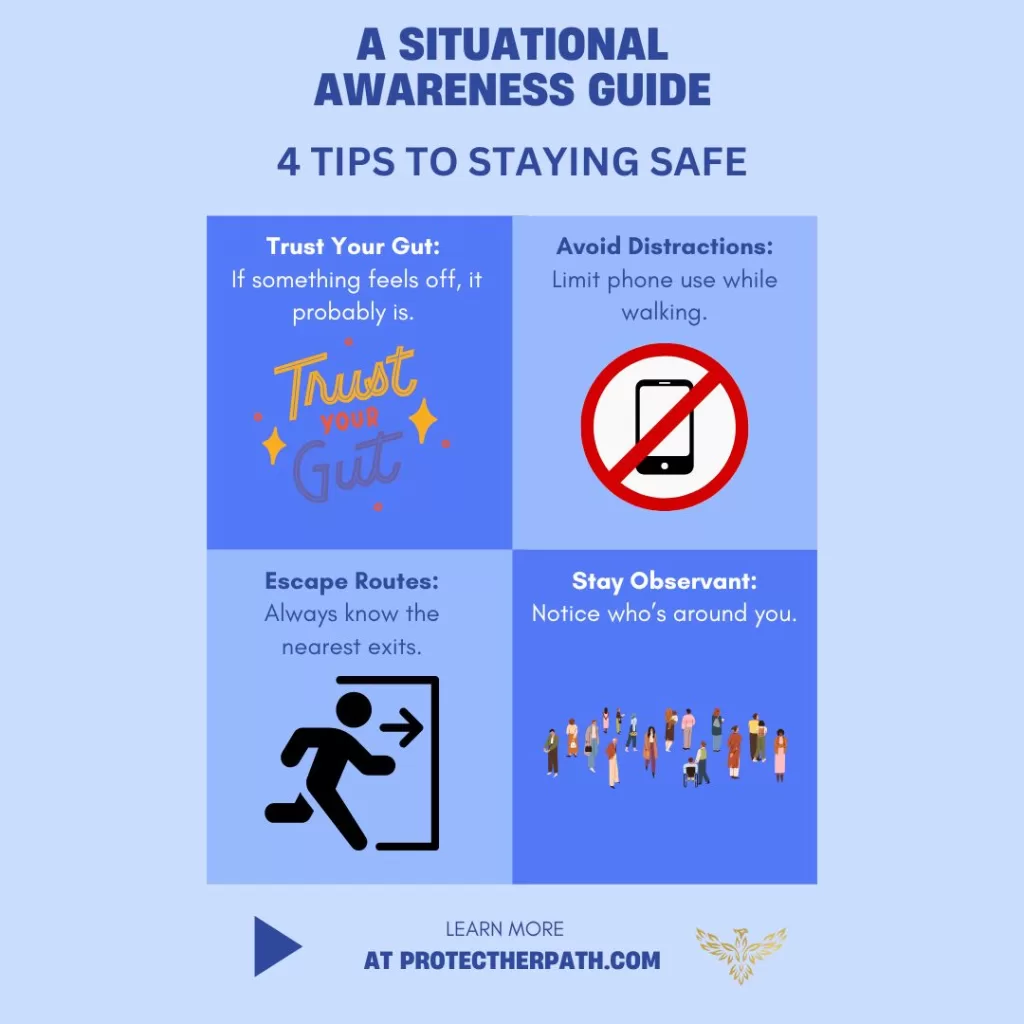The Importance of Situational Awareness: A Guide To Staying Safe

In our fast-paced, technology-driven world, it’s easy to become absorbed in our devices, whether we’re traveling, shopping, walking through a parking lot, or simply strolling through our neighborhoods. However, maintaining situational awareness can be crucial for personal safety and the safety of others around us. Situational awareness means being fully present and aware of your surroundings at all times. This practice can not only save your life but also potentially protect others from harm. Here’s why situational awareness is essential and how you can incorporate it into your daily routine.
The Concept and Benefits of Situational Awareness
Situational awareness is the ability to identify, process, and comprehend information about what is happening around you. It involves understanding the context of your environment, recognizing potential threats, and making informed decisions based on that awareness. For women, developing this skill is particularly important, as it can serve as a powerful tool for self-defense and prevention.
1. Personal Safety
When you’re aware of your surroundings, you’re less likely to be caught off guard. For instance, while walking through a parking lot, noticing the people and vehicles around you can help you spot suspicious behavior early. If someone seems to be following you, you can take action before the situation escalates. Being aware allows you to react quickly and appropriately to potential threats.
2. Protecting Others
Your vigilance can also benefit those around you. In public places, such as shopping malls or parks, your situational awareness can help you identify dangers that others might miss. If you see someone acting suspiciously or notice unattended bags, alerting security or authorities could prevent a potential crime or threat. Your attentiveness can make a significant difference in the safety of your community.
3. Enhanced Decision-Making
Being aware of your environment enables you to make better decisions. For example, choosing well-lit and populated routes when walking at night or parking closer to building entrances. These proactive choices can reduce the likelihood of encountering dangerous situations.
Practical Tips for Developing Situational Awareness
1. Limit Distractions
One of the biggest obstacles to situational awareness is distraction, particularly from mobile devices. When you’re walking, driving, or in public places, minimize your use of phones and other gadgets. This allows you to stay alert and observe your surroundings more effectively.
2. Trust Your Instincts
If something feels off, it probably is. Trusting your instincts is a critical component of situational awareness. If you sense danger or something unusual, don’t ignore it. Take action by moving to a safer location, alerting others, or contacting authorities.
3. Practice Observational Skills
Regularly practice noticing details in your environment. Pay attention to people’s behavior, body language, and the general atmosphere. This practice can help you quickly recognize when something is out of the ordinary.
4. Maintain a Safe Distance
When possible, keep a safe distance from strangers, especially in secluded areas. This space gives you time to react if someone approaches you with harmful intentions.
5. Have an Exit Strategy
Always be aware of the nearest exits in any location, whether you’re in a shopping mall, theater, or public transport. Knowing how to quickly leave an area can be crucial in an emergency.
Using it in Everyday Scenarios
Traveling
When traveling, especially in unfamiliar places, stay alert. Keep your belongings secure, be aware of your surroundings, and avoid sharing too much personal information with strangers.
Shopping
In shopping malls or stores, be mindful of your belongings and surroundings. Keep your purse close to your body and be cautious when using ATMs or carrying purchases to your car.
Parking Lots
Before getting into your car, check the area around it. If you feel uncomfortable, ask a security guard to accompany you. Always lock your car doors immediately upon entering.
Public Places
In public places, such as parks or streets, avoid isolated areas, particularly at night. Walk with confidence and stay alert to your surroundings. If you feel threatened, seek help from a nearby business or a group of people.
Neighborhood Walks
Even in familiar surroundings, it’s essential to stay vigilant. Be aware of your neighbors and any unusual activity. Let someone know your route and expected return time if you’re walking alone.
Conclusion
Situational awareness is a vital skill for women, enhancing personal safety and the safety of others. By staying alert, minimizing distractions, and trusting your instincts, you can navigate various environments more securely. Remember, your awareness and actions can have a significant impact, potentially preventing harm and ensuring a safer community for everyone. Stay aware, stay safe.
Stay connected with us on Facebook and Instagram for more self-defense tips, safety insights, and empowering content tailored to help women walk their path with confidence. Let’s keep the conversation going. Join us today!







[…] teach women situational awareness and proactive safety […]
[…] incident underscores the critical importance of situational awareness. Quinn’s experience highlights that threats can emerge unexpectedly, even from individuals […]
[…] Awareness Saves Lives: Notice unusual activity or signs of forced entry, and don’t dismiss uneasy feelings—they can be the first alert to danger. […]
[…] Situational awareness is the ability to be conscious of your surroundings, to recognize potential threats, and to act quickly if needed. For example: […]
[…] Stay Aware of Your Surroundings […]
[…] Awareness: Self-defense classes teach situational awareness, helping you recognize and avoid potential […]
[…] serves as a sobering reminder of the importance of staying vigilant and trusting our instincts. Situational awareness is a critical skill that can protect us in moments of unexpected danger, but it also reinforces the […]
[…] Protect Her Path, we highlight the importance of situational awareness and the value of training with self-defense techniques, no matter what form they take. This […]
[…] button, can be life-saving when faced with danger. At Protect Her Path, we promote self-defense, situational awareness, and empowering women to take control of their safety. This case shows how having the right […]
[…] Whether you choose to carry in your purse, on your body, or both, the key is training and awareness. Carrying a firearm is a serious responsibility, so make sure you’re ready to handle it […]
[…] is also key. Situational awareness; being mindful of your environment and recognizing potential dangers can be a life-saving skill. […]